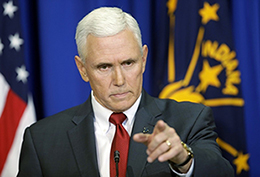Published August 13, 2015 in the Washington Post
Indiana’s Got a Problem: Too Many Teachers Don’t Want to Work There Anymore
By Valerie Strauss
The Washington Post
 Indiana’s got a problem: Teachers increasingly don’t want to work in the state anymore. The problem has become so acute that some school districts have have had a hard time finding enough teachers to cover classes for the new school year — and some lawmakers want a legislative committee to discuss the shortage.
Indiana’s got a problem: Teachers increasingly don’t want to work in the state anymore. The problem has become so acute that some school districts have have had a hard time finding enough teachers to cover classes for the new school year — and some lawmakers want a legislative committee to discuss the shortage.
The percentage of all teachers getting a teaching license — including veterans — fell by more than 50 percent from 2009-10 to 2013-14, and there was an 18.5 percent decline in the number of licenses issued to new teachers during the same period, according to Indiana Department of Education figures.
And, as the Greensburg Daily News reported in a story in early July, fewer students are enrolling in teacher preparation programs at Indiana universities. It said:
At Indiana State University, enrollment in the elementary education program has remained steady, but other areas, especially sciences, are seeing fewer students, said Judy Sheese, assistant dean for teacher education at the university’s Bayh College of Education.
She said she gets weekly — if not daily — calls from principals asking whether the university has any seniors who will soon graduate with a degree in math or English.
“We don’t have any,” she said.
The Muncie Star-Press reported in December 2014 that enrollment in the program to train kindergarten and elementary school teachers fell by 45 percent from the previous decade.
What’s going on? Pretty much the same thing as in Arizona, Kansas and other states where teachers are fleeing: a combination of under-resourced schools, the loss of job protections, unfair teacher evaluation methods, an increase in the amount of mandated standardized testing and the loss of professional autonomy.
The teacher shortage in Indiana is becoming such a problem that some state lawmakers want a legislative committee to study the issue and come up with solutions. According to the Indianapolis Star, the Republican chairmen of the House and Senate education committees have asked General Assembly leaders to approve having the legislative education study committee review what is causing the drop and how the state could respond.
For one thing, they can look in the mirror. The Republican leadership of the state — including Gov. Mike Pence — showed their respect for teachers by working very hard this year to strip power from Indiana Superintendent of Public Instruction Glenda Ritz, a veteran educator who won election to the post in 2012 (by defeating Tony Bennett, the incumbent who was a protege of former Florida governor Jeb Bush). Oh, by the way, she is a Democrat. David Long, the Republican president of the Indiana Senate, said while explaining why the legislature would want to remove Ritz as chairman of the state Board of Education: “In all fairness, Superintendent Ritz was a librarian, okay?”
No, not okay. Ritz worked as an educator and media specialist who won teacher of the year awards at two different schools.
For 2015-17, the state Legislature gave less funding to urban schools and more to charter schools and private schools that accept students with vouchers. A new school funding formula, according to Chalkbeat Indiana, has led to this situation:
Of the 25 school districts with the highest family income, all of them will get more per-student state aid over the next two years.
But what about the 25 with the lowest family income? Just 12 of them get more money in 2016 and 2017 across the board — in overall state aid and per-student aid. The rest get less in one or both areas.
This all helps explain why fewer teachers are finding Indiana a desirable place to work.